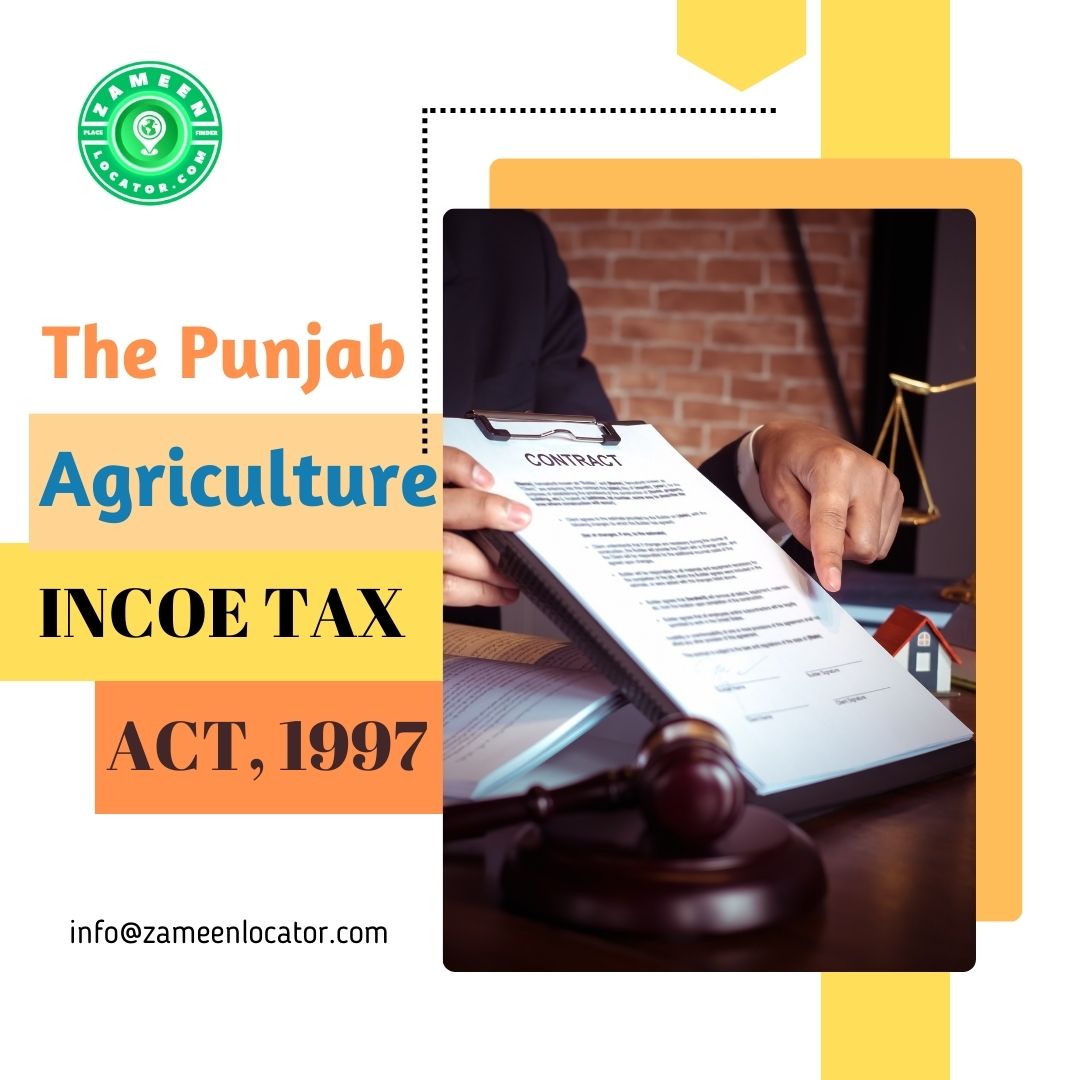
THE PUNJAB AGRICULTURAL INCOME TAX ACT 1997
- The Punjab Agricultural Income Tax Act, 1997, was enacted to impose a tax on agricultural income in the province of Punjab, Pakistan. The objective of this Act is to promote social justice and create an egalitarian society based on Islamic principles. The Act lays down the rules and regulations for the assessment, collection, and computation of agricultural income tax in the province.
Section 1: Short title, extent, and commencement
- The Act is known as the Punjab Agricultural Income Tax Act, 1997. It came into force on the first day of July 1997.
Section 2: Definitions
- This section provides definitions of various terms used in the Act. Key definitions include:
- Agricultural income:
It covers income derived from land used for agricultural purposes, income from agricultural operations,and income from buildings connected to agricultural land.
- Assessee:
Refers to a person liable to pay tax or any sum under this Act, including those who must file agricultural income statements.
- Cultivated land:
Includes land sown at least once during the tax year, except for planted forests or forest nurseries.
- Mature orchard:
Refers to an orchard of a specified age, and its income is considered agricultural income.
- Government:
Means the government of Punjab.
- Return:
Denotes the statement of total agricultural income to be filed by an assessee.
Section 3: Charge of agricultural income tax
- This section establishes the levy of tax on agricultural income for each tax year of an owner. The cultivated land during a tax year is deemed to be agricultural income for this purpose.
Section 3A: Effect of transfers made on or after July 1, 2003
- This section addresses the tax liability of a person who transfers land to his wife or heirs under the age of eighteen. Such persons remain liable for tax even after the transfer until the heir reaches the age of eighteen.
Section 4A: Computation of agricultural income
- This section outlines various allowances and deductions allowed while computing agricultural income. It includes expenses on labor, seeds, fertilizers, rent, and depreciation on agricultural assets.
Section 4B: Allowances to be treated as a deduction from income
- This section clarifies that any allowance admissible under this Act will be included in the total agricultural income but can be deducted for calculating the tax payable by an assessee.
Section 4C: Liability in the case of a deceased person
- The Act holds the legal representatives of a deceased person liable for the tax the deceased would have been liable to pay if alive. It allows for the continuation of assessment proceedings against legal representatives.
Section 4D: Liability of agents representing an assessee
- This section considers an agent representing an assessee as an assessee for tax purposes. The agent is liable to pay the tax on behalf of the assessee and can recover it from the assessee.
Section 8: Penalty for failure to furnish statement, etc.
- This section imposes a penalty for failure to furnish a statement or return within the specified time. The penalty is rupees twenty-five per day of default, subject to a maximum of rupees one thousand.
Section 9: Penalty for concealment of cultivated land, etc.
- This section imposes a penalty for concealing cultivated land or providing inaccurate information regarding agricultural income. The penalty is equal to the amount of tax sought to be evaded.
Section 10: Penalty for default in payment of tax
- This section imposes a penalty for default in payment of tax at the rate of five percent per annum on the amount overdue.
Section 10A: Bar of jurisdiction
- No civil court has jurisdiction in matters related to the assessment or collection of tax under this Act. The Act's orders and proceedings cannot be questioned in any civil court.
Section 12: Rules
- The Government has the authority to frame rules for the proper implementation of this Act.
Section 13: Repeal
- The Punjab Agricultural Income Tax Ordinance, 1997, is repealed.
Conclusion
- The Punjab Agricultural Income Tax Act, 1997, aims to levy and collect taxes on agricultural income in Punjab. It defines various terms and lays down procedures for assessment, collection, and computation of agricultural income tax. The Act also includes provisions for penalties in case of non-compliance.
(FAQs)
- 1. Who is liable to pay agricultural income tax under this Act?
- Answer: Any person who earns agricultural income from land situated in Punjab is liable to pay agricultural income tax. This includes income from cultivation, rent received, sale of agricultural produce, and income from buildings used for agricultural purposes.
- 2. How is agricultural income tax calculated?
- Answer: The tax is assessed based on the total agricultural income of an individual for the tax year. The rate of tax varies depending on the total cultivated land, whether irrigated or unirrigated, and the income range. The specific rates can be found in the First Schedule of the Act.
- 3. Are there any deductions or allowances available for agricultural income tax?
- Answer: Yes, there are various deductions and allowances that can be claimed while computing agricultural income tax. These include expenses related to labor, agricultural operations, purchase of inputs, rent of land, obtaining agricultural loans, and other specified expenditures. These allowances are treated as deductions from the total income before calculating the tax liability.
- 4. Is there any penalty for failure to furnish a statement or return under this Act?
- Answer: Yes, if a person fails to furnish a statement or return within the prescribed time without reasonable cause, a penalty of up to Rs. 1,000 may be imposed for each day of default, subject to a maximum of Rs. 1,000.
- 5. Can legal representatives be held liable for agricultural income tax in the case of a deceased person?
- Answer: Yes, the legal representatives of a deceased person are liable to pay the tax that the deceased would have been liable to pay if he had not died. The legal representatives shall be deemed to be an assessee for the purposes of this Act and shall be subject to the same obligations and liabilities as the deceased. The assessment and recovery proceedings may be continued against the legal representatives as if they were the assessee.






